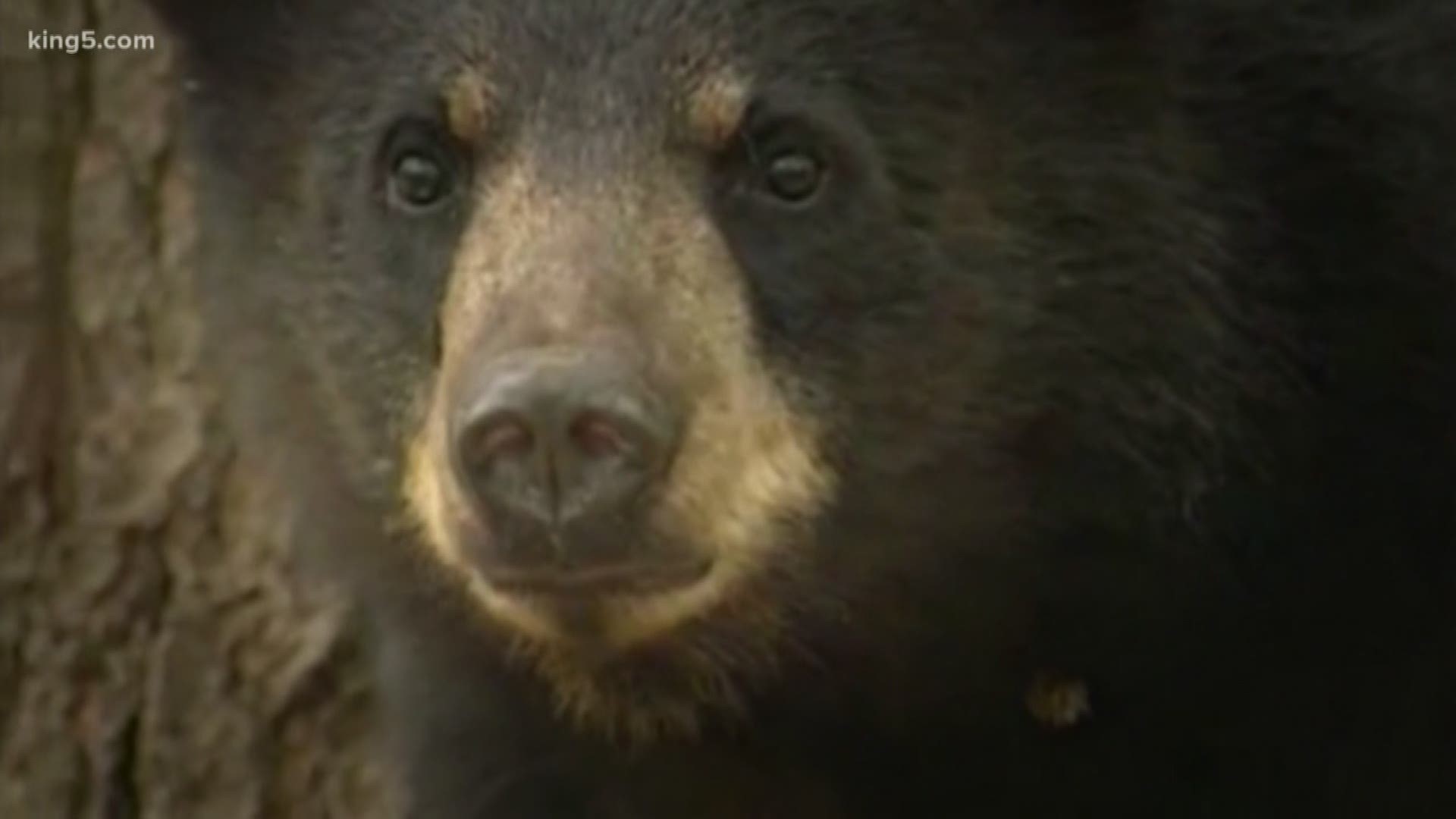OLYMPIA, Wash. — In a final court hearing that followed a year-long legal battle, a Thurston County judge ruled that annual bear hunts on timber farms may continue.
The Center for Biological Diversity sued the state after a KING 5 investigation aired two years ago. The lawsuit claimed the state is allowing hunting practices that violate Initiative 655, a voter initiative from 1996 which outlawed the use of bait, traps, and hounds to hunt bears.
There was an exception built into I-655 which allows the practices to continue for the protection of property, but critics argued the state and timber farmers are abusing the legal loophole.
Every spring, bears wake up hungry from hibernation and trees offer a quick, sugary snack. By peeling the bark to access sweet syrup underneath, bears can damage or even kill trees. Timber farms blame bears for thousands and even millions of dollars in damage every year.
It's why hunters can still use outlawed practices to target bears known to be causing problems. KING 5 Investigators found that instead of targeting bears that peel and damage trees, hunters kill any bear that's around, all approved by the state.
Timber farms are also allowed to conduct what's called a "supplemental feeding" program, which allows for large containers of feed to be left out for bears as a deterrent from eating trees.
In KING 5's investigation, records showed the feeding program was used in some cases to bait bears to their death.
There are no rules about what "feed" can be used, and at least one hunter was caught dumping cooking grease in tree stumps. Documents KING 5 obtained show a common pattern among requests to kill bears that damage trees: hunters and foresters would write that “bear feeder stations are not working.”
Judge Carol Murphy determined that evidence brought by the Center for Biological Diversity did not prove any legal violations.
"I am pleased certainly with the judge's ruling today," said WDFW Wildlife Conflict Manager Dan Brinson. "I am anticipating just getting back to work to where we were when we were sued to begin with, and that is putting together the diverse stakeholder group and continue to make improvements to the program."
"I'm very disappointed and frankly quite stunned. I would not have expected this," explained Lisa Wathne, an original spokesperson for I-655. "The Department of Fish and Wildlife has been so blatantly violating the initiative that it's just stunning to me that they're being allowed to get away with this."
The official codification of I-655 – RCW 77.15.245 – includes the following allowance:
“Nothing in this subsection shall be construed to prohibit the killing of black bear, cougar, bobcat, or lynx with the aid of a dog or dogs by employees or agents of county, state, or federal agencies while acting in their official capacities for the purpose of protecting livestock, domestic animals, private property, or the public safety. A dog or dogs may be used by the owner or tenant of the real property consistent with a permit issued and conditioned by the director.”
Ninety percent of the damage is typically reported in Regions 5 and 6, which covers much of southwest Washington and the Peninsula.
The bear hunts on timberland tend to remove between 35 percent and 40 percent of the bears harvested in the same regions during the recreational hunting season. The public can’t immediately find that data though, as the Washington Department of Fish and Wildlife does not include the timber hunt harvests in the information shared on its website.
Tree farmer Ken Miller told KING in 2017 that bears benefit from habitat saved by tree farming, but nearly ran his family out of business. He said he has no choice but to hire hunters to reduce damage.
“I was desperate, in a panic, because our financial wherewithal for our retirement years was on the line,” Miller said. “That’s big money. That’s like someone stealing money out of your 401(k).”
The controversy centers on an interpretation of what it means to protect private property. It continues to pit the Washington Department of Wildlife against its own staff and the backers of I-655.
Much debate is centered on the “arbitrary and capriciousness” of the Bear Timber Depredation Management Program, as criticized by the Center for Biological Diversity, which argued the state hunt permits don’t follow scientifically or legally sound rules, especially regarding whether the program actually reduces damage year to year.
“We have a very robust population of black bears in the state of Washington,” argued David Bechtold, attorney for the Washington Farm Forestry Association (WFFA) and the Animal Damage Control Program (ADCP).
Judge Murphy questioned whether killing black bears in the means used in WDFW’s permits actually works. Counsel for both WDFW, WFFA and ADCP said that question has not yet been answered by the state.
“That wasn’t the focus of this rulemaking,” said Amy Dona with the Attorney General's Office. “[Staff] were going to brainstorm and think about those issues in the future.”
WDFW has planned to create a stakeholder council, somewhat like the Wolf Advisory Group, to solve some of the concerns with the program. Timber farmers, hunters and animal rights activists have all voiced concerns.
“We’ll keep fighting against the inhumane killing of black bears by pushing for new rules that respect the will of Washington voters," said Sophia Ressler, Washington wildlife advocate and staff attorney with the Center for Biological Diversity. "The people of this state took a stand at the ballot box against this kind of cruel wildlife mismanagement, and they won’t let it continue.”

